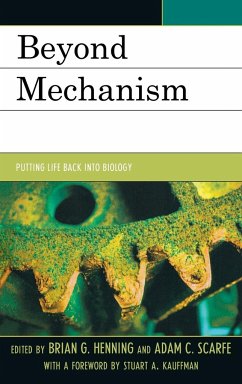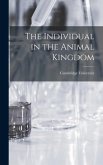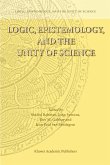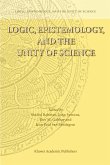- Gebundenes Buch
- Merkliste
- Auf die Merkliste
- Bewerten Bewerten
- Teilen
- Produkt teilen
- Produkterinnerung
- Produkterinnerung
Pairing scientists and philosophers together, this book is an exploration of some of the new frontiers in biology (e.g., Emergence, Complex Systems, Biosemiotics, Symbiogenesis, Organic Selection, Epigenetics, Niche Construction, Teleodynamics, etc.). The chapters in this volume challenge the mechanistic metaphysic that is implicit in the reigning neo-Darwinist paradigm, point to more inclusive modes of thinking in relation to the nature of life, and contribute to the novel synthesis that is presently "in the air."
Andere Kunden interessierten sich auch für
![The Individual in the Animal Kingdom The Individual in the Animal Kingdom]() The Individual in the Animal Kingdom29,99 €
The Individual in the Animal Kingdom29,99 €![Logic, Epistemology, and the Unity of Science Logic, Epistemology, and the Unity of Science]() Logic, Epistemology, and the Unity of Science151,99 €
Logic, Epistemology, and the Unity of Science151,99 €![Holism and Evolution Holism and Evolution]() Jan Christiaan SmutsHolism and Evolution18,99 €
Jan Christiaan SmutsHolism and Evolution18,99 €![The Moral Wager The Moral Wager]() Malcolm MurrayThe Moral Wager76,99 €
Malcolm MurrayThe Moral Wager76,99 €![Logic, Epistemology, and the Unity of Science Logic, Epistemology, and the Unity of Science]() Shahid Rahman / John Symons / Dov M. Gabbay / Jean Paul van Bendegem (eds.)Logic, Epistemology, and the Unity of Science205,99 €
Shahid Rahman / John Symons / Dov M. Gabbay / Jean Paul van Bendegem (eds.)Logic, Epistemology, and the Unity of Science205,99 €![The Idea of Personality The Idea of Personality]() Timothy Bartholomew MoroneyThe Idea of Personality29,99 €
Timothy Bartholomew MoroneyThe Idea of Personality29,99 €![The Problem of Truth The Problem of Truth]() Herbert Wildon CarrThe Problem of Truth27,99 €
Herbert Wildon CarrThe Problem of Truth27,99 €-
-
-
Pairing scientists and philosophers together, this book is an exploration of some of the new frontiers in biology (e.g., Emergence, Complex Systems, Biosemiotics, Symbiogenesis, Organic Selection, Epigenetics, Niche Construction, Teleodynamics, etc.). The chapters in this volume challenge the mechanistic metaphysic that is implicit in the reigning neo-Darwinist paradigm, point to more inclusive modes of thinking in relation to the nature of life, and contribute to the novel synthesis that is presently "in the air."
Produktdetails
- Produktdetails
- Verlag: Bloomsbury Publishing PLC
- Seitenzahl: 484
- Erscheinungstermin: 1. Februar 2013
- Englisch
- Abmessung: 235mm x 157mm x 31mm
- Gewicht: 848g
- ISBN-13: 9780739174364
- ISBN-10: 0739174363
- Artikelnr.: 36905213
- Herstellerkennzeichnung
- Libri GmbH
- Europaallee 1
- 36244 Bad Hersfeld
- gpsr@libri.de
- Verlag: Bloomsbury Publishing PLC
- Seitenzahl: 484
- Erscheinungstermin: 1. Februar 2013
- Englisch
- Abmessung: 235mm x 157mm x 31mm
- Gewicht: 848g
- ISBN-13: 9780739174364
- ISBN-10: 0739174363
- Artikelnr.: 36905213
- Herstellerkennzeichnung
- Libri GmbH
- Europaallee 1
- 36244 Bad Hersfeld
- gpsr@libri.de
Brian G. Henning is an associate professor of philosophy at Gonzaga University. A Summa cum laude graduate in philosophy from Seattle University, Dr. Henning holds a M.A., M.Phil., and Ph.D. in philosophy from Fordham University. His research includes domestic and international invited lectures, book reviews, nearly twenty articles or anthology chapters, two books, and three co-edited volumes, including Beyond Metaphysics? Explorations in Alfred North Whitehead's Late Thought, co-edited with Roland Faber and Clinton Combs (Rodopi 2010) and Being in America: Sixty Years of the Metaphysical Society, co-edited with David Kovacs (forthcoming, Rodopi). His 2005 book, The Ethics of Creativity (University of Pittsburgh), won the Findlay Book Prize from the Metaphysical Society of America. He is co-editor of the Contemporary Whitehead Studies book series through Lexington Books/Rowman & Littlefield. Adam C. Scarfe is an assistant professor of philosophy at the University of Winnipeg. His areas of research are applied ethics, philosophy of education, continental philosophy, and philosophy of biology. Scarfe is the executive director of the International Process Network, an organization dedicated to advancing process philosophy globally. He has published well over twenty-five articles and book chapters, and is the editor and a co-author of The Adventure of Education: Process Philosophers on Learning, Teaching, and Research (Rodopi Press, 2009).
Foreword: Evolution Beyond Newton, Darwin, and Entailing Law Introduction:
On a "Life-Blind Spot" in Neo-Darwainism's Mechanistic Metaphysical Lens
Section 1: Complexity, Systems Theory, and Emergence Chapter 1: Complex
Systems Dynamics in Evolution and Emergence Processes Chapter 2: Why
Emergence Matters Chapter 3: On the Incompatibility of the Neo-Darwinian
Hypothesis With Systems-Theoretical Explanations of Biological Development
Chapter 4: Process-First Ontology Chapter 5: Ordinal Pluralism as
Metaphysics for Biology Section 2: Biosemiotics Chapter 6: Why Do We Need a
Semiotic Understanding of Life? Chapter 7: The Irreducibility of Life to
Mentality: Biosemiotics or Emergence? Section 3: Homeostasis,
Thermodynamics, and Symbiogenesis Chapter 8: Biology's Second Law:
Homeostasis, Purpose and Desire Chapter 9: "Wind at Life's Back" -Toward a
Naturalistic, Whiteheadian Teleology: Symbiogenesis and the Second Law
Chapter 10: Of Termites and Men: On the Ontology of Collective Individuals
Section 4: The Baldwin Effect, Behavior, and Evolution Chapter 11: The
Baldwin Effect in an Extended Evolutionary Synthesis Chapter 12: On the
Ramifications of the Theory of Organic Selection for Environmental and
Evolutionary Ethics Section 5: Autogen, Teleology, and Teleodynamics
Chapter 13: Teleology Versus Mechanism in Biology: Beyond Self-Organization
Chapter 14: Teleodynamics: A Neo-Naturalistic Conception of Organismic
Teleology Section 6: Epigenetics Chapter 15: Epigenetics: Toward An
Inclusive Concept of Evolution Chapter 16: Epigenetics, Soft Inheritance,
Mechanistic Metaphysics, and Bioethics Section 7: Organism and Mechanism
Chapter 17: From Organicism to Mechanism-and Half-Way Back? Chapter 18:
Machines and Organisms: The Rise and Fall of a Conflict About the
Contributors
On a "Life-Blind Spot" in Neo-Darwainism's Mechanistic Metaphysical Lens
Section 1: Complexity, Systems Theory, and Emergence Chapter 1: Complex
Systems Dynamics in Evolution and Emergence Processes Chapter 2: Why
Emergence Matters Chapter 3: On the Incompatibility of the Neo-Darwinian
Hypothesis With Systems-Theoretical Explanations of Biological Development
Chapter 4: Process-First Ontology Chapter 5: Ordinal Pluralism as
Metaphysics for Biology Section 2: Biosemiotics Chapter 6: Why Do We Need a
Semiotic Understanding of Life? Chapter 7: The Irreducibility of Life to
Mentality: Biosemiotics or Emergence? Section 3: Homeostasis,
Thermodynamics, and Symbiogenesis Chapter 8: Biology's Second Law:
Homeostasis, Purpose and Desire Chapter 9: "Wind at Life's Back" -Toward a
Naturalistic, Whiteheadian Teleology: Symbiogenesis and the Second Law
Chapter 10: Of Termites and Men: On the Ontology of Collective Individuals
Section 4: The Baldwin Effect, Behavior, and Evolution Chapter 11: The
Baldwin Effect in an Extended Evolutionary Synthesis Chapter 12: On the
Ramifications of the Theory of Organic Selection for Environmental and
Evolutionary Ethics Section 5: Autogen, Teleology, and Teleodynamics
Chapter 13: Teleology Versus Mechanism in Biology: Beyond Self-Organization
Chapter 14: Teleodynamics: A Neo-Naturalistic Conception of Organismic
Teleology Section 6: Epigenetics Chapter 15: Epigenetics: Toward An
Inclusive Concept of Evolution Chapter 16: Epigenetics, Soft Inheritance,
Mechanistic Metaphysics, and Bioethics Section 7: Organism and Mechanism
Chapter 17: From Organicism to Mechanism-and Half-Way Back? Chapter 18:
Machines and Organisms: The Rise and Fall of a Conflict About the
Contributors
Foreword: Evolution Beyond Newton, Darwin, and Entailing Law Introduction:
On a "Life-Blind Spot" in Neo-Darwainism's Mechanistic Metaphysical Lens
Section 1: Complexity, Systems Theory, and Emergence Chapter 1: Complex
Systems Dynamics in Evolution and Emergence Processes Chapter 2: Why
Emergence Matters Chapter 3: On the Incompatibility of the Neo-Darwinian
Hypothesis With Systems-Theoretical Explanations of Biological Development
Chapter 4: Process-First Ontology Chapter 5: Ordinal Pluralism as
Metaphysics for Biology Section 2: Biosemiotics Chapter 6: Why Do We Need a
Semiotic Understanding of Life? Chapter 7: The Irreducibility of Life to
Mentality: Biosemiotics or Emergence? Section 3: Homeostasis,
Thermodynamics, and Symbiogenesis Chapter 8: Biology's Second Law:
Homeostasis, Purpose and Desire Chapter 9: "Wind at Life's Back" -Toward a
Naturalistic, Whiteheadian Teleology: Symbiogenesis and the Second Law
Chapter 10: Of Termites and Men: On the Ontology of Collective Individuals
Section 4: The Baldwin Effect, Behavior, and Evolution Chapter 11: The
Baldwin Effect in an Extended Evolutionary Synthesis Chapter 12: On the
Ramifications of the Theory of Organic Selection for Environmental and
Evolutionary Ethics Section 5: Autogen, Teleology, and Teleodynamics
Chapter 13: Teleology Versus Mechanism in Biology: Beyond Self-Organization
Chapter 14: Teleodynamics: A Neo-Naturalistic Conception of Organismic
Teleology Section 6: Epigenetics Chapter 15: Epigenetics: Toward An
Inclusive Concept of Evolution Chapter 16: Epigenetics, Soft Inheritance,
Mechanistic Metaphysics, and Bioethics Section 7: Organism and Mechanism
Chapter 17: From Organicism to Mechanism-and Half-Way Back? Chapter 18:
Machines and Organisms: The Rise and Fall of a Conflict About the
Contributors
On a "Life-Blind Spot" in Neo-Darwainism's Mechanistic Metaphysical Lens
Section 1: Complexity, Systems Theory, and Emergence Chapter 1: Complex
Systems Dynamics in Evolution and Emergence Processes Chapter 2: Why
Emergence Matters Chapter 3: On the Incompatibility of the Neo-Darwinian
Hypothesis With Systems-Theoretical Explanations of Biological Development
Chapter 4: Process-First Ontology Chapter 5: Ordinal Pluralism as
Metaphysics for Biology Section 2: Biosemiotics Chapter 6: Why Do We Need a
Semiotic Understanding of Life? Chapter 7: The Irreducibility of Life to
Mentality: Biosemiotics or Emergence? Section 3: Homeostasis,
Thermodynamics, and Symbiogenesis Chapter 8: Biology's Second Law:
Homeostasis, Purpose and Desire Chapter 9: "Wind at Life's Back" -Toward a
Naturalistic, Whiteheadian Teleology: Symbiogenesis and the Second Law
Chapter 10: Of Termites and Men: On the Ontology of Collective Individuals
Section 4: The Baldwin Effect, Behavior, and Evolution Chapter 11: The
Baldwin Effect in an Extended Evolutionary Synthesis Chapter 12: On the
Ramifications of the Theory of Organic Selection for Environmental and
Evolutionary Ethics Section 5: Autogen, Teleology, and Teleodynamics
Chapter 13: Teleology Versus Mechanism in Biology: Beyond Self-Organization
Chapter 14: Teleodynamics: A Neo-Naturalistic Conception of Organismic
Teleology Section 6: Epigenetics Chapter 15: Epigenetics: Toward An
Inclusive Concept of Evolution Chapter 16: Epigenetics, Soft Inheritance,
Mechanistic Metaphysics, and Bioethics Section 7: Organism and Mechanism
Chapter 17: From Organicism to Mechanism-and Half-Way Back? Chapter 18:
Machines and Organisms: The Rise and Fall of a Conflict About the
Contributors









